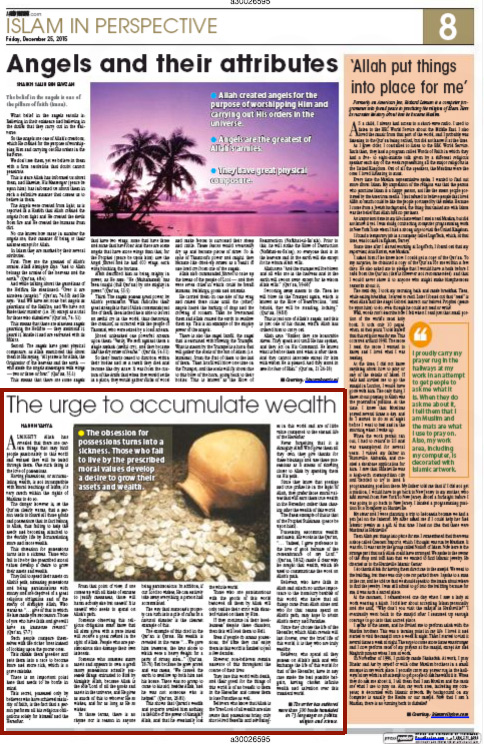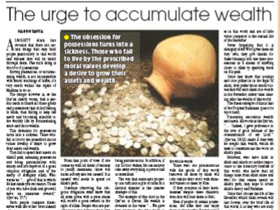
Almighty Allah has revealed that there are certain things that may bind people passionately to this world and warned they will be tested through them. One such thing is the love of possessions.
Having possessions, or accumulating wealth, is not incompatible with moral teachings of Islam; it’s very much within the rights of Muslims to do so.
The danger however is, as the Qur’an clearly warns, that a person tends to hoard all those goods and possessions that in fact belong to Allah, thus failing to help the needy and becoming attached to the worldly life by accumulating more and more wealth.
This obsession for possessions turns into a sickness. Those who fail to live by the prescribed moral values develop a desire to grow their assets and wealth.
They fail to spend their assets on Allah’s path, amassing possessions and being parsimonious with money and are deprived of a great religious obligation and of the mercy of Almighty Allah, Who warns us: “… give of that to which He has made you successors. Those of you who have faith and give will have an immense reward.” (Qur’an, 57:7)
Such people compare themselves with the richer ones instead of looking upon the poorer ones.
This makes them greedier and puts them into a race to become more and more rich, which is a grave mistake.
There is an important point here that needs to be borne in mind.
This secret, possessed only by believers who have achieved maturity of faith, is the fact that a person performs all his religious obligations solely for himself and the Hereafter.
From that point of view, if one comes up with all kinds of excuses to justify meanness, those will harm nobody else but oneself. It is oneself who needs to spend on Allah’s path.
Someone observing this religious obligation must know that all alms given with a pure intent will receive a great reward in the sight of Allah. People who are parsimonious also damage their own interests.
Someone who amasses many assets and appears to own a great many possessions actually possesses things entrusted to him by Almighty Allah, because Allah is the sole Lord of all the goods and assets in the universe, and He gives as much of this to whoever He so wishes, and for as long as He so wishes.
In those terms, there is no rhyme nor is reason in anyone being parsimonious. In addition, if our Lord so wishes, He can entirely take away everything a person has accumulated.
The way that someone’s property can turn into a pile of ruins in a natural disaster is the clearest example of this.
The example of this cited in the Qur’an is Qarun. His wealth is revealed in the verse “…We gave him treasures, the keys alone to which were a heavy weight for a party of strong men...” (Qur’an, 28:76) But because he grew proud and was mean, “We caused the earth to swallow up both him and his house. There was no group to come to his aid, besides Allah, and he was not someone who is helped.” (Qur’an, 28:81)
This shows that Qarun’s wealth and property availed him nothing in the face of the power of Almighty Allah, and that he eventually lost the whole world.
Those who are parsimonious with the goods of this world bestowed on them by Allah will only realize their error with disasters visited on them by Him.
If they continue in their heedlessness despite these disasters, then this will lead them to Hell.
Even if people do amass possessions, the time they can enjoy them in this world is limited to just a few decades.
However, non-believers remain unaware of this throughout the course of their lives.
They lose this world with death, and their greed for the things of this world is of no benefit to them in the Hereafter and causes them to lose Paradise as well.
Believers who know that Allah is the True Lord of all wealth are also aware that possessions bring only short-lived benefits and advantages in this world and are of little value compared to the eternal life of the Hereafter.
Never forgetting that it is Almighty Allah Who gives them all they own, they give thanks for these blessings and use these possessions as a means of drawing closer to Allah by spending them on His path.
Since they know that prestige and true praise lie in the sight of Allah, they prefer those moral values that will earn them true wealth in the Hereafter, rather than chasing after the wealth of this world.
The finest example of this is that of the Prophet Sulaiman (peace be upon him).
Possessing enormous wealth and assets, his words in the Qur’an, “… ‘Indeed, I gave preference to the love of good because of the remembrance of my Lord’.” (Qur’an, 38:32) made it clear why he sought that wealth, which he used to communicate the word on Allah’s path.
Believers, who have faith in Allah and attach no undue importance to the transitory baubles of this world, who know that all things come from Allah alone and who for that reason spend on Allah’s path, may hope to attain Allah’s mercy and Paradise.
Since they choose the life of the Hereafter, which Allah reveals will last forever, over the brief life of this world, it is they who are truly wealthy.
Believers, who spend all they possess on Allah’s path and who exchange the life of this world for that of the Hereafter, have in any case made the best possible bargain, having chosen infinite wealth and salvation over this transient world.
Adnan Oktar's piece on Arab News:


